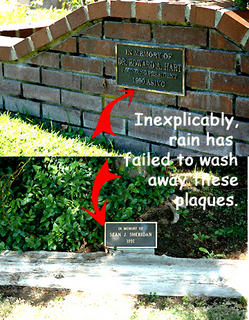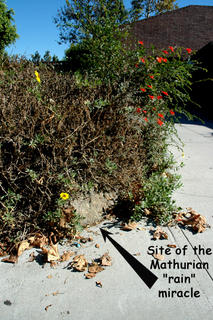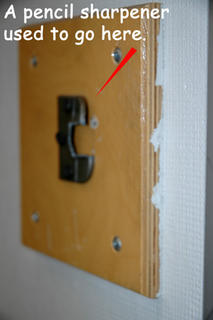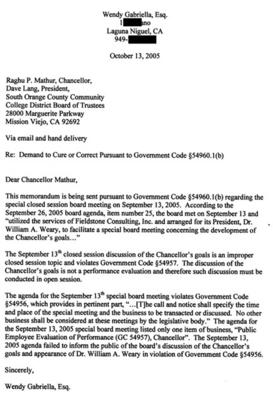 1. Have you noticed that Vice Chancellor Tom Anderson seems to have set up housekeeping at Irvine Valley College? On Wednesday, I saw him at the H&R School meeting; then, yesterday, I noticed him at IVC’s academic senate meeting. This morning, I think I spotted him walkin’ out of IVC's strawberry patch!
1. Have you noticed that Vice Chancellor Tom Anderson seems to have set up housekeeping at Irvine Valley College? On Wednesday, I saw him at the H&R School meeting; then, yesterday, I noticed him at IVC’s academic senate meeting. This morning, I think I spotted him walkin’ out of IVC's strawberry patch!Won’t somebody give him a job and a home?
2. Also at yesterday’s senate meeting: Mr. P from PE was complaining about all the “Cialis” ads he keeps getting on his school email. At one point, Mr. P leaned toward self-appointed Laser and Mathur-appointed homeless person Tom Anderson and asked: “Mr. Vice Chancellor, what can we do about this Cialis spam?”.
Without missing a beat, Tom said, “Well, order some, I don’t know!”
 3. While we’re on the subject of Lasers, there’s some buzzage at IVC about replacing our mascot, the Laser. At the senate meeting, a new hire explained that he worked in marketing for fifteen long years. In fact, he was the guy responsible for the blue and pink marshmallows in Lucky Charms! (I mighta got that wrong. I’m a Fruit Loops man.) Anyway, he’s clearly way knowledgeable, what with the marshmallows and the M & M’s and all, and he thinks that our logo (with the Laser, I guess) “is horrible.” I guess that's right.
3. While we’re on the subject of Lasers, there’s some buzzage at IVC about replacing our mascot, the Laser. At the senate meeting, a new hire explained that he worked in marketing for fifteen long years. In fact, he was the guy responsible for the blue and pink marshmallows in Lucky Charms! (I mighta got that wrong. I’m a Fruit Loops man.) Anyway, he’s clearly way knowledgeable, what with the marshmallows and the M & M’s and all, and he thinks that our logo (with the Laser, I guess) “is horrible.” I guess that's right.Mr. P from PE, too, definitely opposes our mascot. At games, other colleges get to scream, “Go Tigers!” and “Go Rat-Bastards!” You can’t really scream about Lasers. What would it mean?

4. Mr. P is against our college’s name, too. Part of the problem is that there’s no valley here. (Actually, we’re on some kind of plain.) On the other hand, nobody's gonna notice that particular flub. I mean, people around here voted for George Bush.
Some people up here at “Saddleback College North Campus” (that's Dan's suggestion) think that our college has a “stigma,” and maybe even a handful of “stigmata.” So maybe changing our name is just the thing.
And maybe not. I mean, we've worked pretty hard to develop a good academic reputation and all. (Never mind about administration. Bleccch.)
Do we wanna throw it all away?
It looks like the senate isn't gonna weigh in on this anyway.
 5. Recently, Dissent presented transcripts of faculty comments at the momentous June Board Meeting—the one where Raghu got his contract-renewal plus his Quarter-Million-Dollar salary. Our favorite part was when Jeff told the story about Mr. Goo’s “rain miracle”:
5. Recently, Dissent presented transcripts of faculty comments at the momentous June Board Meeting—the one where Raghu got his contract-renewal plus his Quarter-Million-Dollar salary. Our favorite part was when Jeff told the story about Mr. Goo’s “rain miracle”:“In 1997 I was approached by administrators [about] honoring our departing college president Dan Larios with a plaque to be mounted at the site of a small native plant garden that students and I installed a month before…It was a great send-off for Dan that day, and I had the honor of unveiling the plaque.
When Mathur replaced him as president, the plaque soon disappeared from a large rock on which it was firmly bolted. The official word was that the stone plaque—stone plaque—was washed off the rock in the rain.”
 I figured it might be nice to find that rock and take a picture of it. It wasn’t easy, cuz, as you know, IVC is pretty run down, and the rock was pretty much grown over with brush. Well, after some machete work, me and Rebel Girl exposed that rock. Check it out!
I figured it might be nice to find that rock and take a picture of it. It wasn’t easy, cuz, as you know, IVC is pretty run down, and the rock was pretty much grown over with brush. Well, after some machete work, me and Rebel Girl exposed that rock. Check it out!Odd, isn’t it? I inspected several other plaques on campus, some of them older than the “Larios” plaque. Somehow, rain didn’t do a thing to them.
6. We learned that the group (the two academic senate presidents, the union president, Mathur and Lang) that’s been working on a mutually agreeable faculty hiring policy is almost finished. But there is one sticking point—namely, who’s gonna have the most say in deciding who’s on search committees? The district insists that the college President should have the power to choose four of the seven members, but the faculty are standing firm on the senate choosing four of the seven. The faculty position is that it’s inappropriate for administration to control both the start and the finish of the process.
7. Not sure about Saddleback College, but the Accreditation Progress Report re IVC is in the mail. The IVC senate (i.e., its President) worked very hard on it. It's a pretty honest document.
Two members of the Accred team will visit us on Nov. 3rd to see if really real reality matches reported reality. The two Accreds will hang around with “their antennae up,” as Tom A recently explained.
We’ll get the final word from the Accreds some time in February.
8. You’ll recall that the academic senates are thinking of asking the AAUP (i.e., the American
 Association of University Professors) to be our rep in the “Technical Assistance” process (re the issue of defining duties and responsibilities, I believe). It turns out that the State Academic Senate has a formal relationship with the AAUP. That came about when IVC’s Academic Senate reached out to the AAUP after VPI Dennis White banned discussions of the war in the classroom two years ago. (See Archives: April 2003)
Association of University Professors) to be our rep in the “Technical Assistance” process (re the issue of defining duties and responsibilities, I believe). It turns out that the State Academic Senate has a formal relationship with the AAUP. That came about when IVC’s Academic Senate reached out to the AAUP after VPI Dennis White banned discussions of the war in the classroom two years ago. (See Archives: April 2003)But we’re breaking new ground here—apparently, no senate in the community college system has used the AAUP as its agent before. And so the State Senate has to meet to work out the details.
Did I mention that the state academic senate is a very fine organization and that it is run by very fine people?
9. Last year, IVC’s Academic Senate worked with VPI Dennis White to explore the possibility of moving to a “compressed calendar.” The idea seemed to be that a change to that kind of calendar might address our enrollments problem.
Are you aware that Scott Simpson of the district produced a report last summer entitled “Impacts of compressed calendars in California Community Colleges”? Simpson crunched the numbers, comparing districts that adopted compressed calendars with those that have not.
The upshot: there appears to be no reason to believe that a move to a compressed calendar will increase FTES or headcount. Simpson writes:
Administrators at several colleges have reported increases in FTES following the implementation of a compressed calendar with the inclusion of a Winter intercession [sic]. However, these observations have not been placed in the context of enrollment trends occurring among all community colleges, including those that have not adopted alternative calendars. While the present report does not address specific aspects of calculating FTES under the new class schedule…, it will be seen that colleges and districts differ with respect to changes in headcount enrollments and FTES after the establishment of a condensed calendar, but in many cases the increases in enrollment are one-time events and often coincide with general trends in all community colleges in California. (2)
I’ve perused these data (a tedious task), and it does appear to me that they fail to show that moving to a compressed calendar is attended with a permanent increase in FTES or headcount. (Hence, it is unlikely that our enrollment decline can be attributed to students’ preferring other colleges to ours owing to our not having a compressed calendar.)
Included in the report are the results of a survey of state community college faculty, staff, and administrators done by Judith Beachler or Los Rios. The survey does not limit itself to alleged FTES/enrollment advantages to switching to a compressed calendar. (There may be pedagogical and administrative advantages.) Here is Beachler’s conclusion:
The move to a compressed calendar clearly has both pros and cons, making it a decision that should be carefully weighed. Institutionally, there are many compelling reasons to move to a compressed calendar. Moreover, for the most part, it appears to appeal to many students, although there is concern about its impact upon those who struggle. The impact upon faculty and staff must be carefully weighed. Many of the respondents felt that there were negative impacts upon the staff. However, many went on to suggest that in spite of this, it is a
 better format. At the very least, such a change, because of its complexity and organization-wide implications, should be made with very careful planning and perhaps when other multiple complex changes are not being implemented internally at the same time or are externally impacting the organization.
better format. At the very least, such a change, because of its complexity and organization-wide implications, should be made with very careful planning and perhaps when other multiple complex changes are not being implemented internally at the same time or are externally impacting the organization.THE UPSHOT:
1. According to impressive data collected by the district, it is unlikely that our moving to a compressed calendar will slow or reverse our enrollment problems. The data simply do not support the claim that changing the calendar has FTES benefits.
2. Nevertheless, there may well be good non-enrollment reasons for switching to a compressed calendar, if the testimony of many who have experienced a switch is to be believed.




